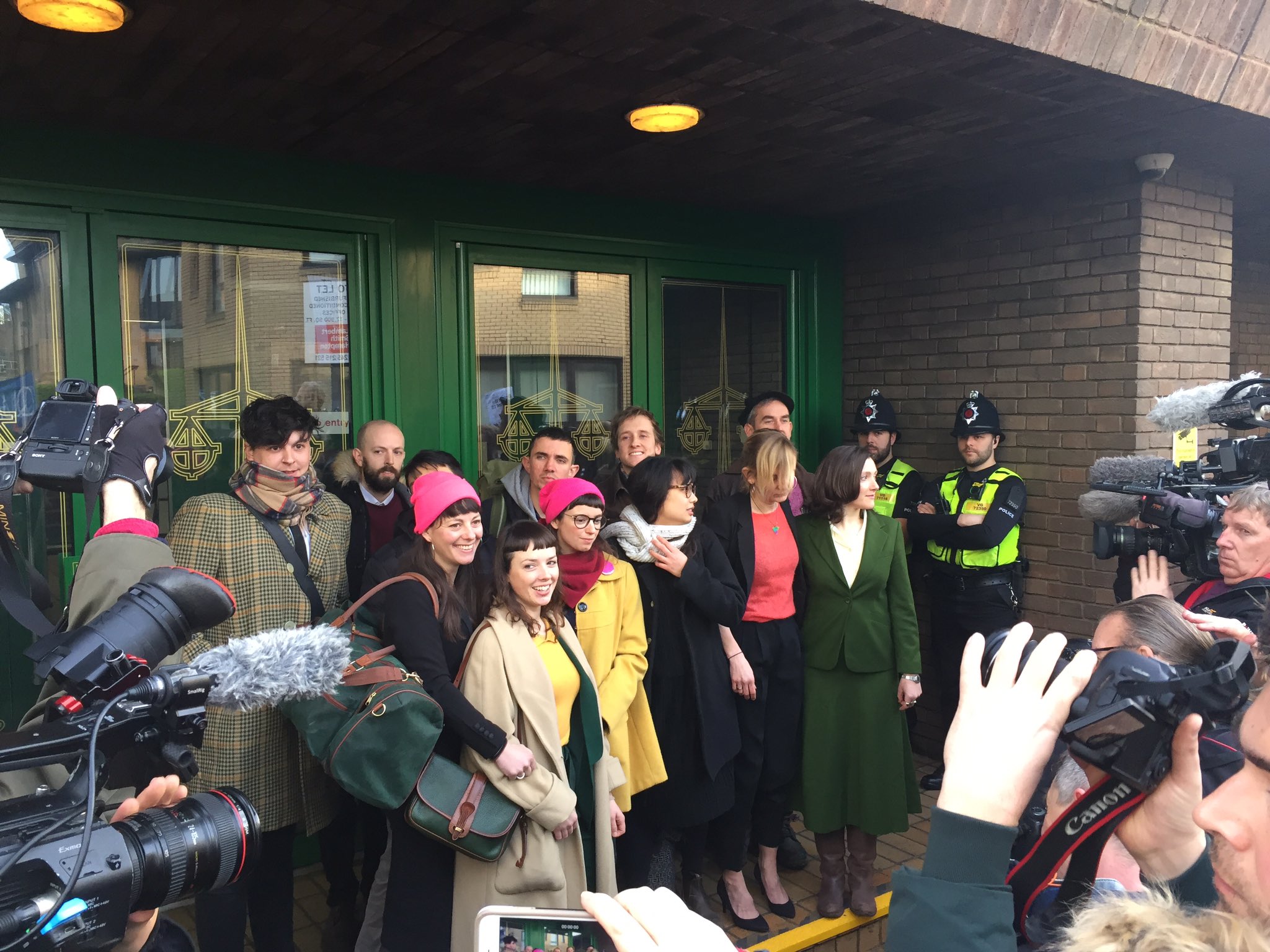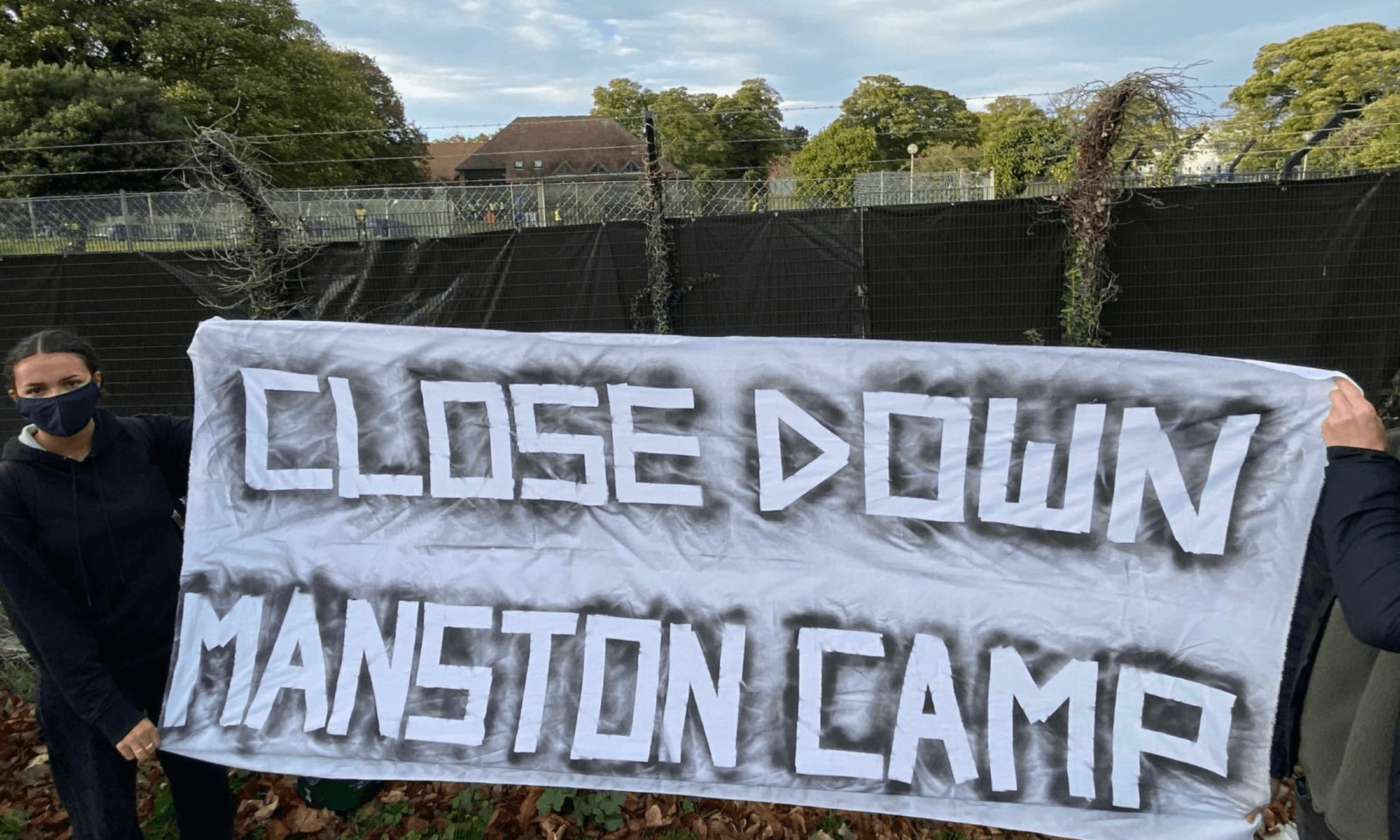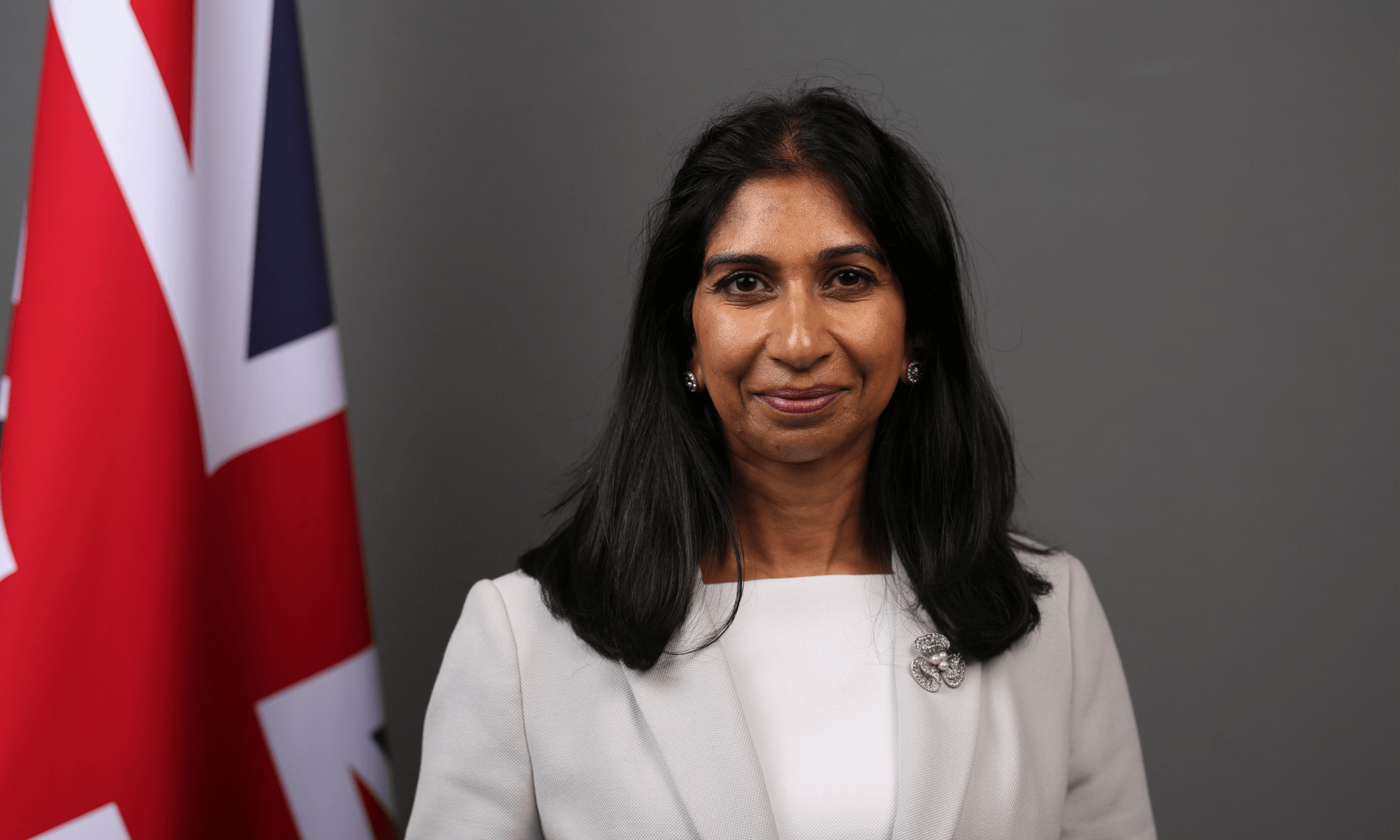
via End Deportations
The Stansted 15 are 15 activists who successfully grounded a mass deportation charter flight in March 2017 by locking themselves down in front of the aircraft’s wheel. The flight was set for departure to Ghana and Nigeria, countries in which the people on board – some of whom were asylum seekers – said they faced the threat of violence and death. Today, on Human Rights Day (10 December) they have been convicted with the terrorism-related offence of “endangering safety at aerodromes” under the UK’s Aviation and Maritime Security Act 1990, a rarely-used law that was created in response to the 1988 Lockerbie bombing. The Stansted 15 will be appealing the judgement.
Throughout the trial, attention was rightly placed on the brutality of charter flights and deportations as context for the defendants’ actions. As court observers, we heard the defendants answer question after question about how their actions on the night were aimed only at removing people from harm’s way, rather than the endangerment of anyone’s safety.
One woman who had been set to be on the flight gave testimony to Detained Voices, a blog which publishes verbatim testimonies from people affected by detention and deportation. She said that she had claimed asylum in the UK because she faced persecution on the basis of her sexuality, but was denied at first instance and after appealing was denied again. She was then detained at Yarl’s Wood Immigration Removal Centre. Before receiving a decision on her second appeal, the Home Office gave the woman a deportation ticket, as per its “deport first, appeal later policy”. “I have been in UK [sic] for six years. I had to leave Nigeria because I was scared of my husband” the woman told Detained Voices. “My husband is trying to kill me, he has reported to the police that I am coming.”
11 of the original passengers on the charter flight remain in the UK today, four have been referred to the National Referral Mechanism – a framework for identifying people who have experienced trafficking or modern slavery – and one person has been granted Leave to Remain status in the UK. It is important to clarify that even though charter flights are mass deportations of so-called “illegal migrants”, this terminology does not have a meaningful definition. No human is illegal. Asylum seekers can be constructed as “illegal”, for overstaying their visa. Others have become “failed” asylum seekers (in the context of an increasingly restrictive asylum regime), because they have previous criminal convictions, do not possess the skills deemed worthy by the Home Office, or in some cases, have simply run afoul of the opaque and violent decision-making bureaucracy of the state. When Muslims are deported and disciplined unjustly, it has too frequently been on the grounds of racist, terror-related legislation.
Corporate Watch, a non-profit which provides critical information on the social and environmental impacts of corporations and capitalism, has shown that it is no longer government officials but facilities and business travel management companies who are subcontracted to manage deportations. This subcontracting perpetuates the lack of public information and knowledge about the extent of the practice and removes the possibility of accountability for human rights violations and acts of violence against people facing deportation. Since the Stansted 15 action, recent deportation flights have taken place from smaller airports such as London Biggin Hill Airport and military bases like Brize Norton, ostensibly to take these practices out of the public eye and remove them as targets of protest.
Such privatisation and militarisation operate in continuity with the Home Office’s focus throughout recent history on removing “illegal” migrants from the UK. The policy of mass expulsion and quotas has little regard for whether a person has lived in the UK since childhood, or whether they are seeking asylum in the UK. Helen Brewer, one of the Stansted defendants, further reminds us that “removal” also encompasses the government policy of “encouraging voluntary returns” – that is, the Home Office’s creation of such untenable, precarious circumstances of securitised surveillance (a “hostile environment”) that those without leave to remain are faced with no other option but to depart. “The hostile environment is linked to the racist trope, peddled by the media, of ‘black criminality’; it reinforces policing in certain communities and feeds into Operation Nexus, a programme where police hand over people who they think they can deport to the Home Office – who are intent in pursuing a target-driven policy borne of a shameful neo-colonial agenda,” Brewer explains. The construction of the illegality and criminality of migrants allows the Home Office to continue to justify its exclusionary policies.
The Stansted 15 didn’t ask to be called heroes, or to be praised for their courage, their sole aim was to “save lives”.
The prosecution of the Stansted 15 and other activists is a continuation of the British state dressing up bigotry as domestic security. In a debate in the House of Lords about the proposed Counter-Terrorism and Border Security Bill, Baroness Jenny Jones stated: “[W]e’ve seen time and again that the state will use the law creatively to deter and punish those who put their bodies on the line to fight injustice and environmental destruction.” Perhaps that is why the state have decided to crack down on the Stansted 15 specifically, given that climate justice organisers who engaged in similar actions at Heathrow in 2016 did not face terror-related charges in their trial. Drastic prosecution will deter others from taking direct action in the face of injustice, especially the disregard for black and brown lives.
Maintenance of the border is both legal, political, and symbolic of the anxieties of the British state as it undergoes a retrenchment of practices of colonial exclusion. The line of argument used by the prosecution has made clear not only its powers to invoke health and safety within the framework of terror as a justification for suppressing dissent, but its fear of the lengths to which conscientious individuals will go to protect human rights and life.
Resistance continues, whether through protests led by women detained in Yarl’s Wood, solidarity protests outside detention centres and the Home Office, or community actions to resist the hostile environment. People are coming together in the knowledge that the British state’s policies are a danger to everyone’s civil liberties and human rights. Of course, vulnerability to such danger is gendered, racialised, and a product of different colonial legacies – and of course, it is also significantly linked to immigration status. But resistance has emerged not simply in spite of, but because of a growing understanding of the violence of the state apparatus, and the need to counter it with a politics of solidarity.
On 5 November, a rally was called outside Chelmsford Crown Court to support the defendants as they headed back into court after a week-long recess. Supporters, including the All African Women’s Group, Frack Free Four, parents of the defendants, and members of the local Quaker community, passed around flapjacks and brownies and huddled to keep warm. During the speeches, a representative from the African Women’s Rape Action Project said: “When the state tries to stop groups of people from taking direct action, they’re trying to terrorise. They’re trying to stop us from coming together and committing to doing the kind of action that we know we need to do.”
If it is solidarity that the state is trying to criminalise, it has not been successful, at least not with this crowd. What we have in common is concern and care. Not only for the defendants as they haved moved through the trial, but for the people who were on that flight who have since been deported, who have been granted leave to remain, or who are still waiting. And, for the countless others who are experiencing the material reality of the state’s inhumane policies.
The Stansted 15 didn’t ask to be called heroes or to be praised for their courage, their sole aim was to “save lives”. In her closing speech on 29 November, defendant Mel Evans explained: “I acted as I did because I wanted to protect other human beings from harm. This was never about politics. It was about people’s lives”. In taking action, the Stansted 15 became objects of the state’s heavy hand – its use of the “sledgehammer” of anti-terrorist legislation to crack down on peaceful direct action.
It is important for us to adopt the same surveilling gaze of the state back onto itself. Just as the state has shown a clear willingness to clamp down on civil liberties, we must persist in scrutinising its every move. There is power and strength in remaining vigilant about the state’s encroachments on the rights and freedoms of all, as we commit ourselves to stand witness to and push back against injustice. They put their bodies on the line to prevent a potential threat to and loss of life, now we have to show we’ll stand with them.

Britain’s policing was built on racism. Abolition is unavoidable

How Pakistan’s Khwaja Sira and transgender communities are fearing and fighting for their futures

Their anti-rape performance went viral globally. Now what?






